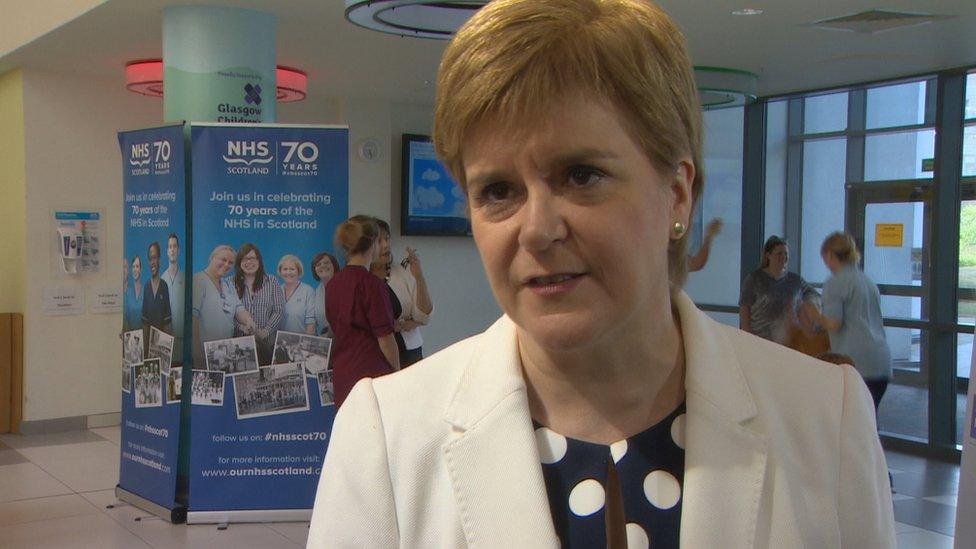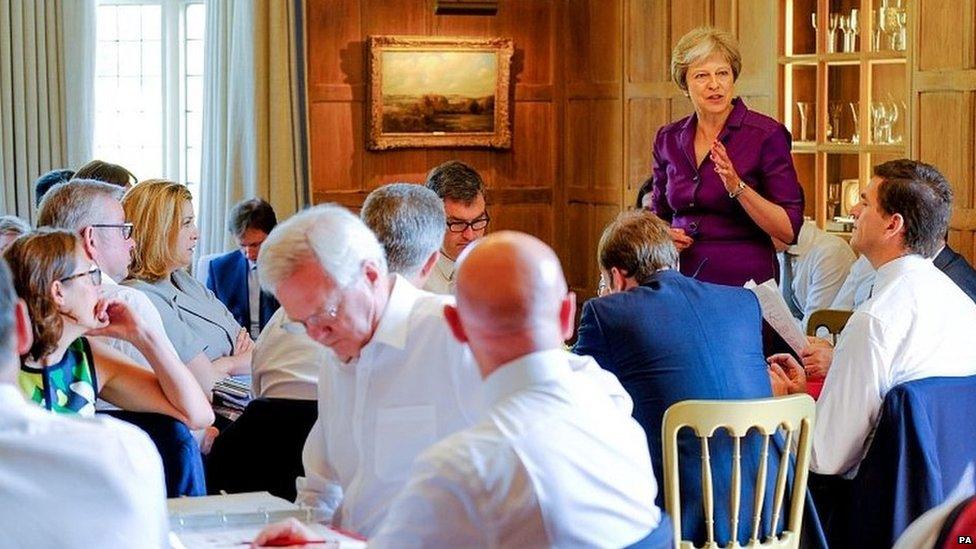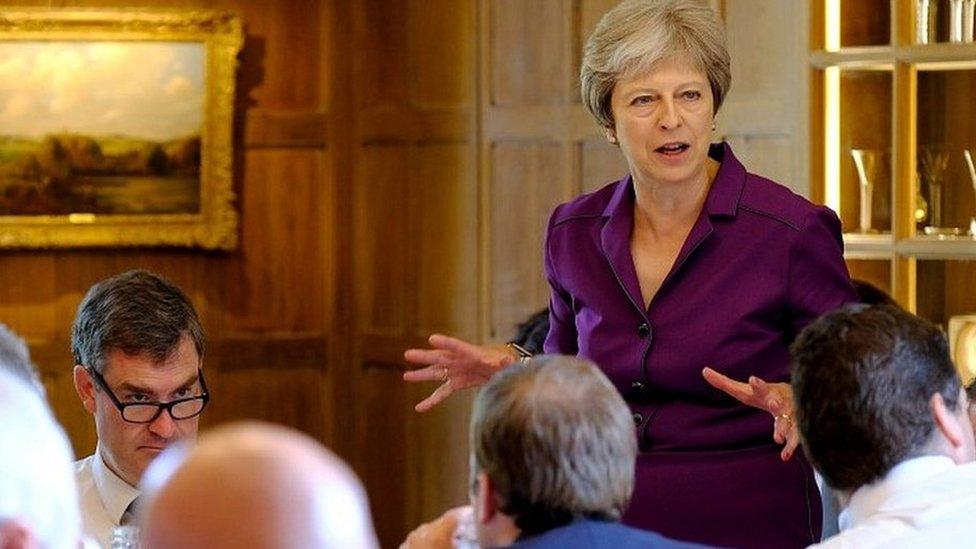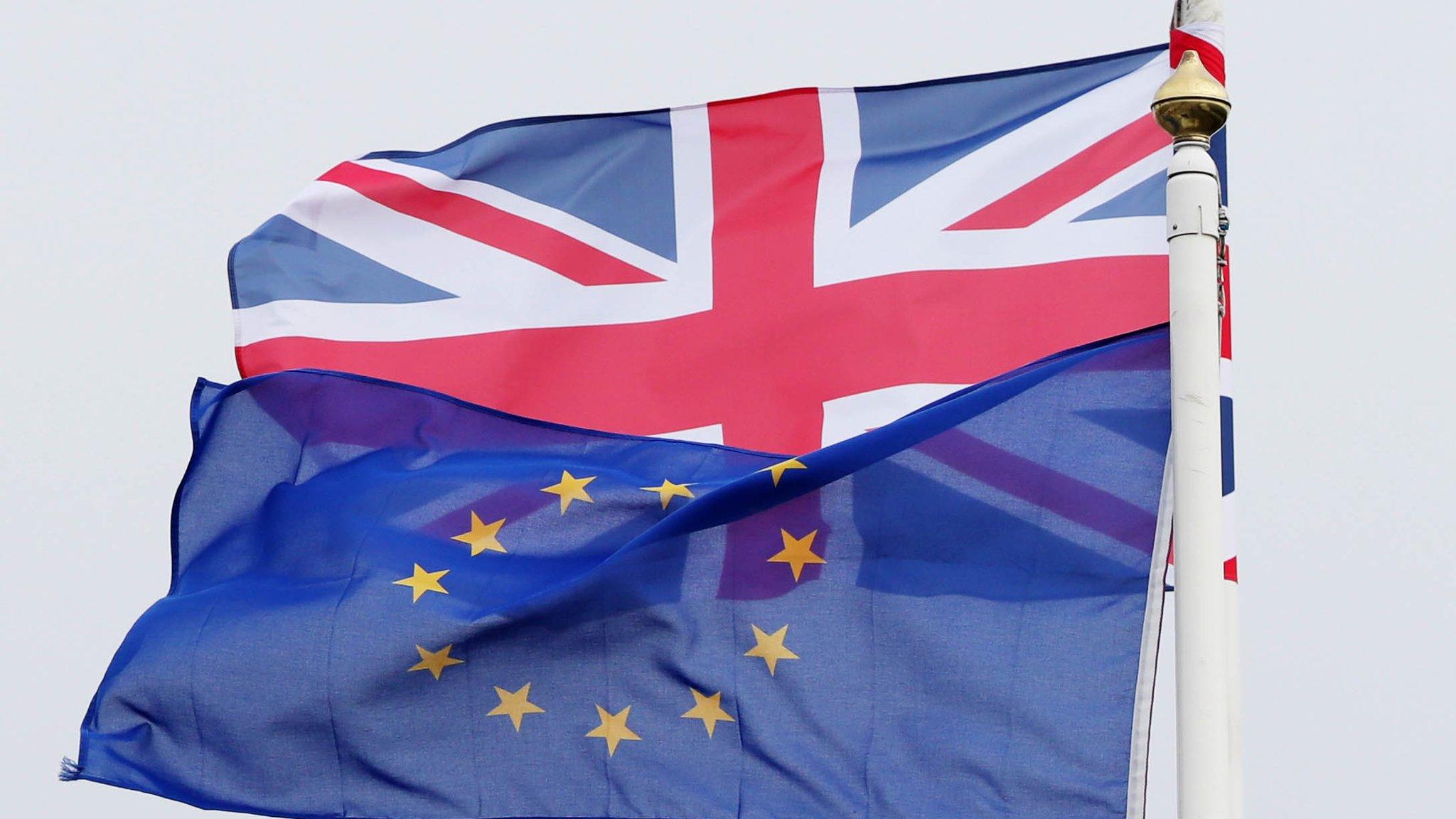Nicola Sturgeon: May's Brexit plan 'hopefully a step forward'
- Published

Nicola Sturgeon said the outcome of the meeting at Chequers was "hopefully a step forward"
Scotland's first minister has said the UK government's "collective" agreement on Brexit could be "game on" for those in favour of a single market/customs union outcome.
Theresa May's cabinet signed up to a plan on future trading arrangements following a 12-hour meeting on Friday.
Downing Street said it marked a "substantial evolution" in the UK's position.
Nicola Sturgeon said it was "hopefully a step forward".
Scottish Conservative leader Ruth Davidson said the proposals agreed provided clarity and delivered for Scotland "in three key areas".
The plan was agreed by the prime minister's senior ministers at a 12-hour cabinet awayday at Chequers.
Theresa May speaks after 12-hour cabinet meeting
It would create a free trade area for industrial and agricultural goods with the bloc, based on a "common rule book".
Ministers also supported what could amount to a "combined customs territory".
Mrs May said the proposal for UK-EU relations after Brexit "will be good for the UK and good for the EU".
She is now seeking Conservative MPs' backing for the proposals.
EU negotiator Michel Barnier tweeted to say the plans would be assessed to see if they were "workable and realistic".
Responding to the outcome of the UK cabinet meeting Ms Sturgeon tweeted: "There is more realism in it than we've seen before from UK government (though that's not saying much!) - so, to that extent, hopefully a step forward.
"However still massive unresolved questions about acceptability to EU (it still reads like cherry picking and an attempt to divide four freedoms), deliverability (given the sheer complexities), and desirability (especially around impact on services - a real and profound concern)."
Ahead of meeting, the first minister had urged Theresa May to "face down the hard-line Brexiteers in her cabinet" and come to a "common sense" position on the customs union.

The UK cabinet met at Chequers to discuss plans for future trading with the EU
Responding to what was agreed by the UK cabinet, Ms Sturgeon added: "Perhaps key point is this - if this becomes the UK starting point in negotiations, it is surely game on for those who would prefer to see a full single market/customs union outcome.
"And, of course, it still remains to be seen if PM can hold her dysfunctional party together on it."
Scottish Conservative leader Ms Davidson said it was now "time to put differences aside".
She said the proposals agreed at Chequers "deliver in three key areas - providing Scottish business with frictionless access to the EU market; withdrawing the Scottish fishing industry from the hated Common Fisheries Policy and, by ensuring no border in the Irish sea, bolstering Scotland's biggest and most important market, the UK internal market".
'Starting point'
She added: "The UK is leaving the EU. On the table is a pragmatic set of proposals that go a long way to addressing the concerns of those worried about the economic impacts of a 'hard' Brexit.
"An admission from the SNP that such fears have been largely addressed would help reassure Scotland's business, agri-foods and fishing communities."
Scotland's Constitutional Relations Secretary Mike Russell said the prime minister's "attempt to cherry-pick from the single market" was "not likely to be well received by the EU 27".
He added: "This so called agreement is, so far, very one sided. It is what the UK wants, but it is not what the EU has agreed. It can therefore only be a starting point for discussion at best, and further movement from the UK will be required."
Scottish Secretary David Mundell urged the Scottish government to "get behind our proposals".
He added: "The UK government has a clear position to achieve a deal with the EU which is in the best interests of Scotland and the whole of the UK."
Scottish Labour leader Richard Leonard described the UK government's latest Brexit plan as a "sticking plaster solution".
He added: "Previous allegedly unanimous positions in Theresa May's government have quickly fallen apart - and there is no reason to think this will be any different.
"Labour is the only party with a plan to deliver a Brexit deal that protects our economy and workers' rights, as well as the devolution settlement."
- Published7 July 2018

- Published6 July 2018

- Published9 July 2018
- Published5 July 2018
